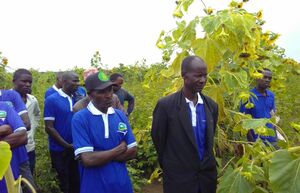
As part of last year's human rights campaign "What should we dress with", UEM has initiated a programme to help Tanzanian farmers convert to organic cotton.
In March 2020, Dietrich Weinbrenner, responsible for the initiative on sustainable textiles, visited the Busega region in the north-west diocese of the Evangelical Lutheran Church of Tanzania (ELCT), where the programme is being implemented.
One hundred farmers on a total area of 100 hectares are involved in the programme. In workshops they were taught the basics of organic cotton cultivation. They can make their own pest control products from plants that grow in their environment. Sunflowers, which the farmers plant along the fields, play a special role. A certain type of moth that threatens cotton plants is attracted by the yellow colour of the sunflowers and thus kept away from the cotton plants. In this way the farmers save the cost of the pesticides they used to spray and also no longer come into contact with the toxic pesticides. The sale of the sunflower oil obtained also provides additional income.
The local company BioRe, which has been cultivating organic cotton in the region for many years, was won as a cooperation partner, providing the know-how and the necessary seeds. Another cooperation partner is the local company Bio-Sustain, which buys the entire harvest from the UEM programme. In this way, the farmers are financially secured.
Both the North-West Diocese of the ELCT and the district government of the region expressly support the programme. The Tanzanian government also wants to strengthen the cultivation of organic cotton nationwide and also to establish further production phases of the textile industry and thus the value creation in the country. Consideration is therefore already being given to extending this programme to other regions.
This was the question that dominated the VEM's human rights campaign in 2019. Not the worry of having anything to wear at all, but the agony of choice is a challenge for many people in Germany in view of the morning view into an overflowing wardrobe.
Clothes are offered in many shops today at extremely low prices. This often happens at the expense of the workers in the textile factories. More than 1.5 million people in Indonesia are employed in the textile industry. "Workers often have to stay overnight at the factory to meet their quota. They often lack the time to go to the toilet." So says Dina Septi Utami, an employee of an organization in Jakarta that campaigns for the rights of women workers. Dina Septi Utami reports on the different forms of violence and intimidation to which women workers are subjected, from beatings, abuse, humiliation and sexual violence to forced prostitution.
With the Action for Human Rights in the Textile Industry, we want to raise awareness of the sometimes inhumane conditions in the global textile industry. At the same time, we want to inform the public about how they can contribute to positively influencing consumer behaviour and consume sustainably produced clothing in a responsible manner.
As the United Evangelical Mission we support victims of human rights violations and ask for your help. In connection with this campaign we support the work of Dina Septi Utami in Jakarta as well as the Methodist Church in Sri Lanka for better living and working conditions for women workers in the textile industry.
For advice and further information please contact Pastor Dietrich Weinbrenner (weinbrenner-d@vemission.org)
The information brochure on sustainability in the textile industry with projects from Africa, Asia and Germany as well as educational material for schools or community work can be downloaded here.
The UEM campaign is published in cooperation with this year's human rights campaign of the EKD, which also deals with the topic of sustainability in the textile industry.
IBAN: DE45 3506 0190 0009 0909 08
SWIFT/BIC: GENODED1DKD
spenden@vemission.org
0202-89004-195
info@vemission.org
0202-89004-0
presse@vemission.org
0202-89004-135
CRDB BANK PLC / Branch 3319
Account# 0250299692300
Swift code: CORUTZTZ
Bank BNI
Account# 0128002447
Swift code: BNINIDJAMDN
info@vemission.org
presse@vemission.org